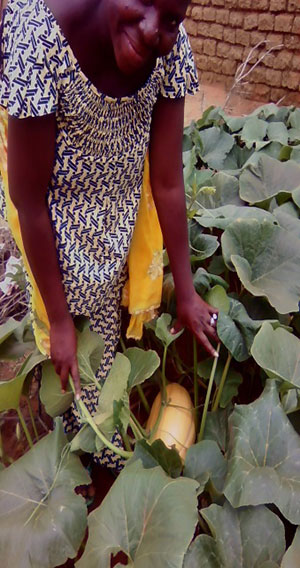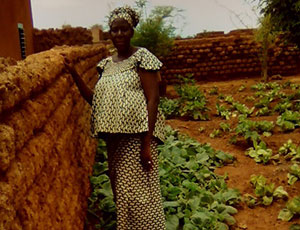A Community Leader Improves Her Family’s Nutrition through Household Gardening

Village Voice, Family Champion
Denise Dougnon, 38, lives in Ama Iré village in the Mopti Region of Mali with her husband, two children, two sisters-in-law, and a brother-in-law. A graduate of the local farmer nutrition school (FNS) administered by the SPRING, Denise helps lead the Jeanne d’Arc Association of Koro, a community group dedicated to improving gardening techniques for members and their families.
During the FNS from June 2015 to February 2016, participants completed courses on gardening, agroforestry, and marketing. In one module, trainers used the community garden in Denise’s village to teach participants how to create raised planting beds and how to use compost. In another, participants learned to differentiate between more nutritious vegetables—like okra, eggplant, squash, and beets—and less nutritious—such as shallots, winter peppers, and chili peppers.
Denise also learned marketing techniques to raise her family income by selling extra crops. Denise has a 450-square meter household garden where she grows okra, chili peppers, eggplant, squash, moringa, and peppers. In the cold season, she also grows shallots, lettuce, beets, and cabbage.
The trainings I received from the SPRING project taught me about the benefits of the different crops we grow. Before, we didn’t know their nutritional value.
--Denise Dougnon, farmer nutrition school graduate and community leader
Providing for Women Providers
Encouraging women to diversify their crops and teaching them about sales improves the lives of entire families by elevating mothers to the role of financial provider and enabling them to proactively improve family nutrition, even though the work can take time from women’s usual activities.
The SPRING project encourages husbands to share labor-intensive household tasks. This helps to avoid over-burdening women with time commitments and labor and enables them to incorporate what they learn into their daily routine.
Denise’s husband is a health volunteer in a small village about 20 kilometers from Ama Iré. Each weekend when he returns home, he helps Denise with the physical labor of the household garden: raising plant beds, deepening the family’s two wells, and transplanting plants. “My husband really appreciates my contributions to the family. Our decisions are very much shared,” said Denise.

Sharing Knowledge and Bounty
Since graduating from the FNS, Denise has shared techniques from her training with 10 other people through the village communal garden, improving production and nutrition for her own family and her community.
Lessons from the FNS helped Denise increase her production of squash from five squash in 2015 to 35 squash in 2016. Combined with her new marketing techniques, she also saw an improvement in her sales. On market day, she now earns up to 15,000 West African Francs (US$25).
The advantages of the new training go even further. Denise’s sister-in-law is pregnant, and her prenatal consultations have all been positive. Denise credits this to the more nutritious, varied daily diet the family is eating thanks to the improved vegetables grown in her garden.
“Some part of everything that we grow goes into the pot,” Denise said of her family’s healthy diet.